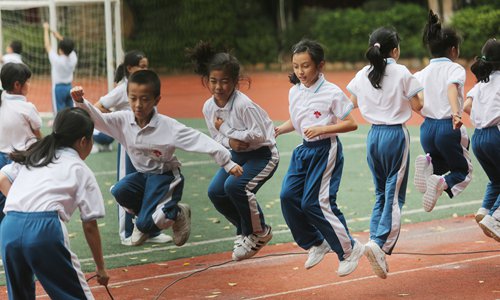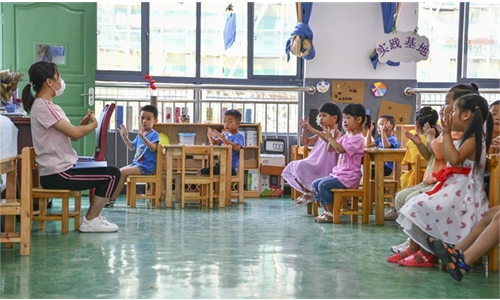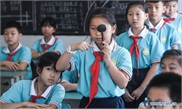Proposal on strengthening education aimed at making boys more 'masculine' triggers debate

Students in Foshan, Guangdong Province, play rope skipping after class. File Photo: VCG
Chinese education authority has recently vowed to enhance physical education and psychological direction in a response to a previous proposal from a top policy advisor calling on the country to strengthen "masculinity" education for boys, which has ignited heated debate on the internet.
The proposal has won some support, while many on the internet believe it might lead to gender stereotyping. Experts noted that the goals of education should be to train students to be more responsible, and called for a more tolerant and diversified evaluation system for children.
In a Thursday reply to the proposal on "avoiding feminization of teenage boys," the Chinese Ministry of Education said it will solve the problems from several aspects including enhancing the research on issues related to youth mental health education.
In May 2020, during the national Two Sessions, Si Zefu, a member of the Standing Committee of the 13th CPPCC National Committee and chairman of Harbin Electric Corporation, said that the "feminization" trend of Chinese teenagers, if not managed effectively, will harm the existence and development of China. "Many Chinese teenage boys nowadays have the characteristics of weakness, low self-esteem and timidity, and they tend to follow the pretty-boy superstars," said Si.
Si believed this phenomenon could be attributed to the fact that most teachers in schools from kindergarten to high school stage are women, as well as to the frequent appearance of "pretty boys" in TV and films.
The reply from the Ministry of Education triggered a widespread discussion on the internet over the weekend. The related hashtag has been viewed more than 2 billion times with 250,000 comments as of press time on Sina Weibo.
Discussions focus on what "masculinity" is and what the boys really need in education.
"It is a beauty for men to show their toughness in demeanor, spirit, and physique… Education is not only meant to foster 'men' and 'women,' but also duty and responsibility," read a CCTV editorial on Sunday.
"The anxiety about lack of 'masculinity' is itself a discrimination due to certain kind of mindset. In subconsciousness, such people consider 'female', 'girly' and 'feminine' are bad and each sex should have a certain kind of look in life," noted an editorial on iFeng.com. "Why doesn't the Ministry of Education worry that more physical exercise will make girls too 'masculine?'"
Sun Yunxiao, an education expert, was quoted by the CNR as saying that while it is true some boys are relatively 'weak,' and the situation calls for attention, people's 'temperaments' are naturally diversified and there is nothing good or bad about it. "We should not attach stereotypes to sexes."
"Girls could be tough, and boys could be gentle," he said.
"If masculinity means a boy should not cry, then it is a stereotype," Yu Ka, a primary school teacher in East China's Fujian Province, told the Global Times.
But Yu also shared his observation that some boys are not as tough as many girls among her students. "I feel boys are too spoiled by families and the society," Yu said, pointing to the traditional mindset of valuing boys.
Chu Zhaohui, a research fellow at China's National Institute of Education Sciences, called for a diversified evaluation system. "Currently, evaluation is based on scores to a large extent. Even if boys perform well in areas other than learning, they won't get much appreciation. For many boys, they cannot do what they want to do, which is not conducive to cultivating independence, courage and perseverance," Chu told the Global Times.
"Masculinity means having a relatively strong sense of independence, willpower and perseverance, including physical fitness," Chu said.
"We should leave it to the nature of the person. We have destroyed the natural state of students and what we need to do now is to correct it and let them return to normal and be more natural," Chu said.




